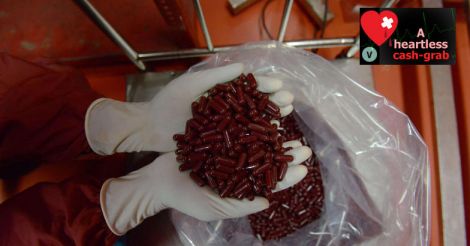The fifth and final part of a special feature on unhealthy trends and unholy nexus in the healthcare industry
A doctor couple, who retired from Kozhikode Medical College Hospital, say the rest of their lives will be in fear of a group known as super specialists. They are saying this because of the experiences their family and friends have had. When a sister of one of them caught fever and became very weak after treatment by specialists, she was brought to Kozhikode from Kochi. There a general practitioner diagnosed that she had only a minor problem. The doctor brought her to normal life by giving medicine for a week.
Die on a ventilator
If a hospital has 20 beds with ventilators and if there are not enough patients to fill them, the result will be a loss. In these circumstances, patients are kept on ventilators for days, sometimes even after death. Despite knowing that no treatment will yield results, some relatives want their elders to die on a ventilator. It is this insistence that is exploited. Dr K. Suresh Kumar, a former director of the Institute of Palliative Medicine, says when he wrote about spending final days in ICU and on ventilator in Manorama, he had received many phone calls.
Shouldn’t prevention come first?
Diseases have evolved and treatment has become very technical. The main reasons for many diseases, including kidney failure and heart problems, are diabetes and high blood pressure. If these two are diagnosed early, they can be controlled by taking low-priced medicines. Dr K.P. Aravindan, a former head of pathology department in Kozhikode Medical College and president of Sasthra Sahitya Parishad, says what turns many people sick is overeating and lack of exercise.
Even when so much noise is made about health issues, primary preventive measures do not get importance. Doctors and hospitals should not be allowed to become totally free entities. For that, the state needs a health care policy.
When hospitals became corporate bodies, treatment became a source of profit. Corporate establishments led by professional managers replaced old hospitals. Once salary became an incentive, many doctors started ordering patients to undergo unnecessary tests.
To change the situation in which doctors take commission and prescribe medicine, changes must be made to punish monopolies that give commission.
Though medical field has become so complex, health care is not becoming a political issue in the state where political awareness is so high. Even though the centre passed a Clinical Establishments Act to regulate private hospitals, Kerala has not done much on the same line. Though a draft was prepared, no further steps were taken.
Who will look after a patient?
Now, the general public helps a lot to facilitate organ transplantation. However, no one thinks about the cost of follow-up medicines, says Kidney Foundation of India CEO Thomas Joseph. Voluntary organisations who arrange dialysis free of charge and those who help people to undergo surgeries do a great service. But a patient who underwent kidney transplantation has to take medicines for life, which will cost about Rs 10,000 a month. Government aid to people who underwent organ transplantation is only Rs 1,000. From where will they get the rest of the money?
Please do something
Dr Nagesh Simha, president of the Indian Association of Palliative Care, says, many times, people lead a life forgetting the truth that they are humans who will die. Even when it is certain that a person cannot be saved, the wrong practices of giving chemotherapy and putting the patient on ventilator at that stage are followed. The pressure from relatives of patients is also a problem. Their attitude is ‘do something and save somehow’. Family, relationships and the practices in India are all fine. But they should know where to put a full stop. Isn’t continuing with treatment as if a person will never die a mistake?
Palliative care is not a treatment, but a philosophy. The doctor has to understand what it is. A patient must be provided an opportunity to die with less pain in a peaceful state. When it is 100 per cent certain that a patient will not survive, he must not be given the pain of treatment. Instead, that person needs love, care and medicines to reduce pain. If the patient won’t survive, it must be conveyed to him. Realising that the end is near, it is time for palliative care. Palliative care is not only for cancer patients but also for HIV, kidney and heart patients and those who are paralysed.
Final moments at home
A person who does not have any particular disease, but only health problems associated with old age, might fall sick in the last stage of his life. Immediately should that person be pushed into the loneliness of an ICU? Even if that question is an annoying one, it is born out of reality. Treatment and care of the elderly deserve a lot of importance. If their health can be sustained by giving good treatment and medicines, that is ideal. However, in some circumstances, it will be better not to trouble them with more check-ups, surgeries, medicines and injections. Let us wish to experience the presence and love of our family members and lie peacefully in the shade of our homes waiting to hold the hand of death, because it is inevitable and it will take all of us away one day.
(Prepared by Jayan Menon, N.V. Krishnadas, Gayathri Jayaraj and Joji Simon and compiled by George Varghese)

























Disclaimer
The comments posted here/below/in the given space are not on behalf of Manorama. The person posting the comment will be in sole ownership of its responsibility. According to the central government's IT rules, obscene or offensive statement made against a person, religion, community or nation is a punishable offense, and legal action would be taken against people who indulge in such activities.